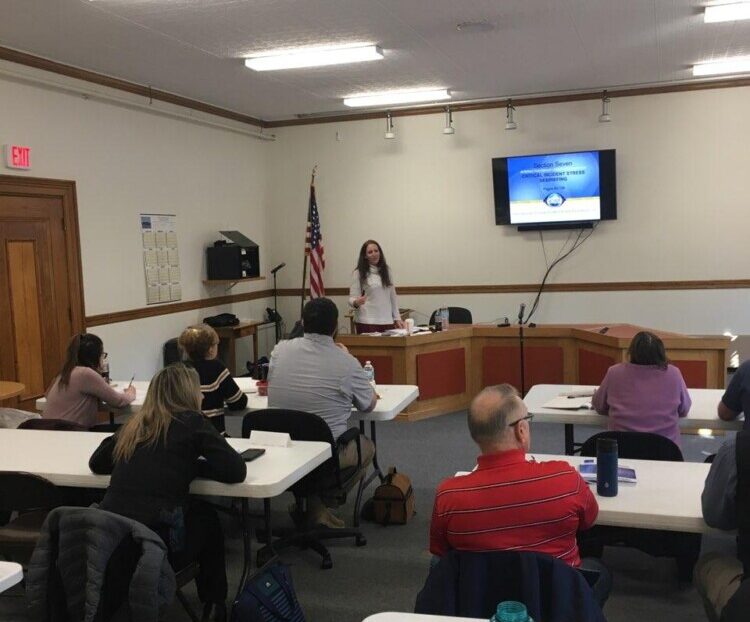SKOWHEGAN — The police department took another step forward in pursuing its goal of having 100% of its officers trained in responding to crises involving mental health. Three of their number, as well as mental health care providers, attended a course taught by an instructor from the National Alliance on Mental Illness Maine.

Police officers and mental health care providers attend a class this week in Skowhegan where they were trained in crisis intervention stress management. Hannah Longley, director of community programs at NAMI Maine, taught the course.
Police Chief David Bucknam said that in his nearly three years as chief in Skowhegan, his department, along with others around the state, has seen an increase in mental health-related calls. One of the goals of this week’s program was to train officers to be more aware of and to better gauge traumatic situations.
The program, Crisis Intervention Stress Management, was a two-day, 16-hour course where attendees talked about responses and reactions that would get them through traumatic events. This is the second training the Alliance has provided. Police staff received the mental health first aid course previously.
Hannah Longley, director of community programs at NAMI Maine, taught both courses.
“It’s important to note that it’s not group therapy, but it can have a therapeutic value to it,” Longley said.
Right now, Bucknam said, about 70% of his staff is trained in mental health first aid and about 40% have been trained in crisis intervention. The department has a Crisis Intervention Team, and its officers are trained to recognize the signs and symptoms of a mental health situation.
Longley said, “It’s a commitment on their part to have the best practices that really connect with the resources of the community and have a community approach when responding.”
Mental health first aid training includes learning risk factors and warning signs for mental health and addiction and strategies to help those in crisis or noncrisis situations. Those who receive the training are also taught what resources are available so they know where to go for help.
Responders themselves are beneficiaries of the training.
“First responders are one of the highest risk populations for (post-traumatic stress disorder), depression and anxiety and one of the highest risk populations of dying by suicide,” Longley said. “We are losing more first responders across the board to suicide than in the line of duty.”
NAMI Maine CEO Jenna Mehnert explained the importance of having trained personnel when crises occur, referencing the propane explosion in Farmington last September as an example of the importance of NAMI’s outreach.
“When the explosion happened, it involved firefighters and law enforcement,” Mehnert said, noting that it’s ideal to have a way to make sure that folks who are involved are taken care of. “If the situation is prolonged, we make sure that their immediate needs are met. We also offer group debriefings to bring (the people who are affected) together.”
Mehnert said that similar debriefings took place within the community after Somerset County Cpl. Eugene Cole was killed in the line of duty in 2018. The idea of the training model, Mehnert said, is to bring in volunteers who have dealt with similar scenarios but were not directly involved in the event and who can help people through the process.
“It’s important to have these resources because what we know about post traumatic stress disorder is that people develop it when they do not have opportunities that help them immediately,” Mehnert said.
Deputy Chief Brian Gardiner attended the training earlier in the week and said that its practical application was a refresher for many who attended.
“We handle critical instances all the time,” Gardiner said. “It’s crucial to the mental health of our officers and our public safety colleagues to have an after-action debriefing.”
Bucknam said that officers arrive from the Maine Criminal Justice Academy with some training on mental health, but it’s important that they continue to receive additional courses to keep up with what’s new.
“They receive some training while they are in the Maine Criminal Justice Academy, so this training is kind of a refresher for everybody,” Bucknam said. “It also brings up the latest and greatest thought processes, ideas and directions (so) that we can help steer people who are experiencing a mental health issue as far as getting them the help that they need.”
To complete the course, participants have to roleplay different intervention scenarios and demonstrate that they understand the material that was presented. Following that, they receive a certificate of completion.
Longley credits Bucknam on his continued commitment to protecting his community in all aspects. Other departments that have also made the commitment include those from Waterville, Augusta, Winslow and Gardiner.
“Chief Bucknam has made a substantial commitment to his community and department,” Longley said. “He watches out for their well-being.”
Send questions/comments to the editors.




Success. Please wait for the page to reload. If the page does not reload within 5 seconds, please refresh the page.
Enter your email and password to access comments.
Hi, to comment on stories you must . This profile is in addition to your subscription and website login.
Already have a commenting profile? .
Invalid username/password.
Please check your email to confirm and complete your registration.
Only subscribers are eligible to post comments. Please subscribe or login first for digital access. Here’s why.
Use the form below to reset your password. When you've submitted your account email, we will send an email with a reset code.